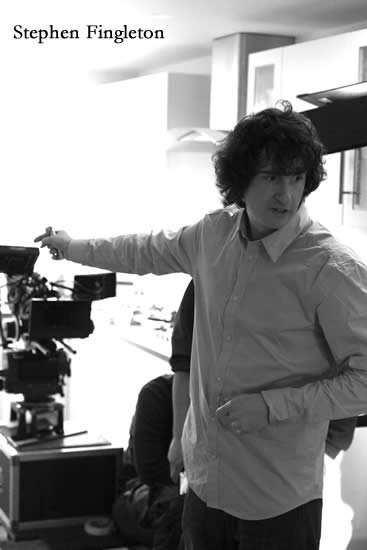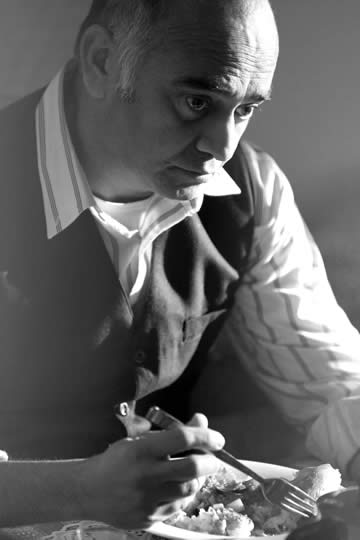 Stephen Fingleton was born in Derry, Northern Ireland. He made his first films with the UCLU Film Society, using the same 16mm cameras Christopher Nolan shot his first movies on. He is the recipient of Northern Ireland Screen’s Bill Miskelly award, and his short films have won several awards and have screened at over sixty international festivals, including the BFI London Film Festival. His feature film THE SURVIVALIST was a finalist in Northern Ireland Screen’s New Talent Focus scheme, and has attracted interest from major players in the industry. He is represented by Independent Talent Group in the UK and WME in the United States.
Stephen Fingleton was born in Derry, Northern Ireland. He made his first films with the UCLU Film Society, using the same 16mm cameras Christopher Nolan shot his first movies on. He is the recipient of Northern Ireland Screen’s Bill Miskelly award, and his short films have won several awards and have screened at over sixty international festivals, including the BFI London Film Festival. His feature film THE SURVIVALIST was a finalist in Northern Ireland Screen’s New Talent Focus scheme, and has attracted interest from major players in the industry. He is represented by Independent Talent Group in the UK and WME in the United States.
Stephen’s new short film Shirin was screened at the 2012 Palm Springs Shortfest International Film Festival and market. Shirin starts in a late afternoon at the Sadak household in London. Shirin and her father have supper alone. The usual awkwardness of a father and his young adult daughter is increased by the distance her father feels at Shirin’s assimilation into British culture. As they wait for Shirin’s mother, the awkwardness increases
Bijan Tehrani: How did you come up with the idea of the film Shirin?
Stephen Fingleton: I live in London, and there have been a number of so-called honor killings in the city. Teenage girls have gone missing and in several high profile cases their parents have been convicted of the killings. No one was really making any narrative films about it that were reaching an audience, so when I came up with right story I felt I had to make it. There is an ongoing murder trial going on at the moment for the parents of a young woman who disappeared called Shafilea Ahmed. Her sister has testified she saw her sister getting smothered to death with a plastic bag – if true, I find this particularly shocking as that was the murder method in Shirin, one I based on guesswork because the police couldn’t find blood in the family homes.
BT: How has your film been received?
SF: A number of major festivals in America have shown it – Palm Springs, Cleveland, Newport Beach – but none of the majors in Europe will, including places that have shown my work before. If I had to guess, I think it’s because it’s a controversial subject. There’s a lot of Islamophobic media coverage, and I think programmers worry that a film like this may add to that environment, and it’s particularly risky coming from an ‘outsider’ filmmaker not from the communities these killings typically occur. Beyond festivals, we’ve had some good coverage – the BBC did an interview with me about honor killing and we’re linking up with a charity called Karma Nirvana to promote the online release and their campaign.
BT: One thing that you do cleverly is that you are not targeting a certain nation in this film.
SF: That was deliberate. The character names are Kurdish but the actors are from all different backgrounds and it is never specific what country or religion the characters are from. I chose Kurdish because they are a nationality not overtly associated with Islam, and I wanted a film which looked at the crimes from a cultural rather than a religious perspective.
BT: How did you actually go about casting the film?
SF: Originally I wanted to cast within the Kurdish community in the area of Haringey in London. I did open auditions at the community center there but a lot of the actors came from a community theatre background and didn’t have the right level of performance for a cinema piece. The film is very dialogue based, and very much plays on subtext, so you can’t use improvisation to bring the characters closer to the actors. Ultimately I realized I needed an experienced screen actor and cast Bhasker Patel – he’s been in every show on TV twice and is currently a lead actor on a the British soap Emmerdale. The role of Shirin was much tougher as whoever played her had to be young enough to play the role but confident enough to pull it off on screen. I saw many people for the role but ultimately went with Hussina Raja. I had seen in a friend’s short film called No Uniform where she played a supporting role but was fantastic. Hussina is a  very different person to the character she plays in the film, but I auditioned her several times and through that process we were able to get the character we wanted. I think the film really stands on her performance.
very different person to the character she plays in the film, but I auditioned her several times and through that process we were able to get the character we wanted. I think the film really stands on her performance.
BT: How was the film received at Palm Springs Short Film Fest?
SF: People have a very physical reaction to it. By design the film is a punch in the gut – the film has a very deliberate, low key run-up and only a minority knows what will happen. The audience were very emotional and needed to talk about it afterwards. There was a lot of demand for the film in the video library – I had to leave in a couple of extra copies so people could see it.
BT: What are your future plans; will you make a feature film with the same kind of subject?
SF: I think the subject matter is much better suited to short film – it’s about a life cut short. You can end on her death and cut to black and you don’t have to pull your punches as you would with a feature. Short films find their audiences passively. The audience doesn’t know what they’re going to see when they go into a short film programme – this is a fantastic opportunity for a dramatist. But a feature film needs to bring audiences in, and I wonder how many people would actively to go and see a film about honor killing. The subject matter is among the most depressing I know – it’s a rebuke to hope and humanity.
I am putting together my first feature at the moment but it’s very different – a British science-fiction called “The Survivalist”.

